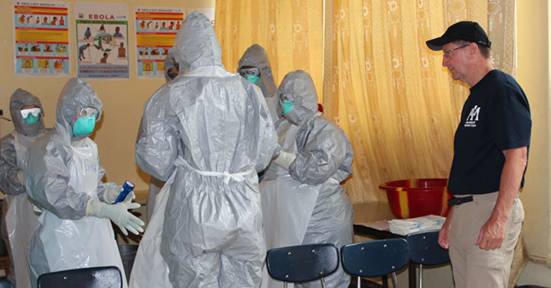News
How You Can Help Healthcare Workers in West Africa

The worst Ebola outbreak in history has now killed nearly 2,300 people, and left 4,200 sickened in Guinea, Liberia, Sierra Leone, Nigeria and Senegal. The World Health Organization (WHO) is estimating that it will take six to nine months to curtail the outbreak.
Ten percent of the deaths are healthcare workers. The high proportion of nurses, doctors and other healthcare workers infected during the current outbreak of Ebola in West Africa is “unprecedented”, the World Health Organization has said.
The lack of protective gear for healthcare workers is putting their lives at risk every day. A nurse in Monrovia, Liberia described the nurses at her hospital cutting up old uniforms and tying them over their faces, since they do not have respirators.
"It is really pathetic," she said. "We are not equipped to face the situation."
HOW YOU CAN HELP
RNRN is working with the International Medical Corps (IMC) to support their efforts to save lives by getting protective gear to nurses and providing treatment on how to use the protective gear.
Please donate today to help provide protective equipment and training to healthcare workers in West Africa.
“This epidemic should not be seen solely as a West African issue but a global issue. Ebola is an international crisis that requires swift, international response. There is a severe lack of resources for the Ebola humanitarian response, both for treatment and prevention.”
-- Rabih Torbay, Senior Vice President of International Operations for International Medical Corps
IMC has been delivering humanitarian support in the West African region since 1999 and is responding to the current outbreak in Sierra Leone and Liberia, where the Ebola outbreak is devastating the healthcare systems. Healthcare workers continue to leave hospitals due to weak infection control, lack of training and access to personal protective equipment. There are few isolation units and lab testing facilities for Ebola throughout the region. Also, those in need of primary healthcare are not seeking help in fear of contracting Ebola at a health facility or because those services are no longer available as many of the facilities have closed. Furthermore, there is significant concern regarding food security as people are not planting crops due to the outbreak and food shortages are expected.
PLEASE HELP NOW
"The number of new cases is moving far faster than the capacity to manage them in Ebola-specific treatment centers," the WHO said. The insufficient staff and resources needed to treat Ebola cases is one of the factors leading to the high infection rate among healthcare workers.
‘‘When you have too many patients, you have too much to do, you get tired and when you’re exhausted, you make mistakes,’’ said Jorge Castilla, an epidemiologist with the European Union’s Department for Humanitarian Aid.
During a BBC interview, Dr. Gabriel Fitzpatrick discussed the pressure health workers face on the front lines of Ebola. “Many of the inpatients are former health care staff themselves,” he said. “We’ve had doctors, nurses, laboratory technicians, ambulance drivers—a whole range of health care staff from Sierra Leone and from this region being admitted to this facility. It’s difficult when you see your health care colleagues suffering from this terrible disease and in most cases dying from it. It’s quite a difficult situation to work in.”
RNRN is working with groups on the ground – IMC, the World Health Organization, and healthcare worker organizations in Liberia and Sierra Leone -- to monitor the situation and bring aid to the nurses and patients affected by this epidemic in West Africa.
Is Your Hospital Prepared for the Ebola Virus?
“This potential exposure of patients and health workers illustrates the critical need for planning, preparedness, and protection at the highest level in hospitals throughout the nation,” said Bonnie Castillo, Director of CNA/NNU's RNRN.
Nurses are on the front lines of any public health emergency. Please join us in gathering information about the level of preparedness in our hospitals. Please take action to stem the tide of this terrible virus.
HERE'S WHAT YOU CAN DO TO HELP:
- Please fill out the survey so that we can better determine the safety standards in your acute care hospital, and determine next steps to ensure the safest patient care.
- Donate to the RNRN's drive to protect nurses with Ebola patients.
- Review and share the Nursing Practice and Patient Advocacy Alert.
Ebola viruses are transmitted through direct contact with blood or bodily fluids of an infected person, or through exposure to needles that have been contaminated with infected blood or bodily fluids. Healthcare workers must exercise extreme caution and follow CDC guidelines to insure protection from the virus.
Thank you,
California Nurses Foundation
Registered Nurse Response Network
2000 Franklin St. Oakland, CA 94612
RNRN Disaster Relief Fund: National Nurses United and the Registered Nurse Response Network (RNRN) work to send nurses to disaster stricken areas both inside the U.S. and internationally. Please complete this secure donation form and share it with friends to ensure that RNs are among the first responders. RNRN is a project of the California Nurses Foundation (CNF), a 501(c)(3) nonprofit, and works in cooperation with the National Nurses United (NNU). Donations are secure, and tax-deductible to the extent of the law.